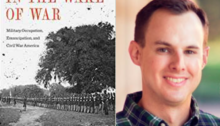Teach My Book: Andrew F. Lang on In the Wake of War: Military Occupation, Emancipation, and Civil War America
Historians of the American Civil War have authored an impressive and increasingly complex history of the common soldiers who waged the conflict. Explaining soldiers’ motivations to enlist, charting a steadfast commitment to their respective national causes, unfolding their multifaceted views on race and emancipation, and placing citizen-volunteers within their mid-nineteenth-century contexts, the rich scholarship on…


